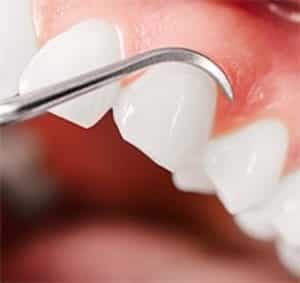Receding Gums: Are Your Teeth in Peril?

No cavities, no problem, right? Wrong! Even the straightest and whitest of teeth can fall prey to a serious case of receding gums, a common condition that can sneak up and do some damage before many individuals realize it’s even a problem.
While a surefire way to detect and treat it is with regular visits to the dentist, meticulous at-home monitoring and preventative care is also a great line of defense. Here’s what you should know to keep the threat of gum recession at bay.
SIGNS AND SYMPTOMS OF RECEDING GUMS
Gums don’t recede overnight, but if you pay close attention, you can spot telltale signs of the problem: a tooth that appears much longer than its neighbors, yellow stains where the tooth touches the gum line, or even a ridge you can feel on the affected tooth, indicating your gums have shifted. Tooth sensitivity is another red flag, as a declining layer of protective gum tissue can leave nerves beneath the enamel exposed.
CAUSES OF RECEDING GUMS
Many things can cause vital gum tissue to detach and recede, but the most common culprit is untreated gingivitis. If you have gum disease, chances are that gum recession is just around the corner.
Other possible causes include:
- Clenching or grinding your teeth aggrevates the supporting bone.
- Smoking/tobacco use, which can impact blood supply to the gums
- Crooked teeth that can pull on the gums, and also lead to gingivitis
- Brushing too hard, thereby resulting in unnecessary pressure and irritation
- Oral piercings that force precious tissue aside over time
- Genetics, an inherited predisposition to gum recession
- Diabetes, which has been linked to receding gums
- Aggressive orthodontics can move the teeth too far from the supporting bone.
Depending on the root cause, the rate of recession may vary, but being aware of all the possible factors can help you steer clear of other hazards and behaviors that will only aggravate the problem.
IN-OFFICE TREATMENT OPTIONS
The good news is that, if you do have a confirmed case of receding gums, all is not lost. Whether it is mild or extreme, in-office treatments are available to help halt recession — and in some instances, even restore lost tissue.
Periodontal therapy is an effective procedure your dentist may recommend to put a stop to further gum erosion. This process involves laser treatments that target and sanitize the problem area(s). With proper care and time, it is possible for the gum tissue to reattach to the tooth’s surface.
For patients with severe gum recession, the dentist may ultimately advise surgery. Grafting is one common option that may be offered, in which tissue from a donor or another area of your mouth is applied to the affected area. Periodontal surgery or “pocket depth reduction”, is another alternative that involves removal of diseased tissue altogether. This treatment may be recommended only if the gums have receded to such a point that tooth loss is imminent, and it can result in tooth sensitivity.
OTHER STEPS YOU CAN TAKE
In addition to seeking professional help, preventative care is critical to combating gum recession. Due to its gradual nature, sometimes a few proactive measures can go a long way:
-
- Use a mouth guard at night to keep teeth grinding from stressing the gums and bone.
- Brush and floss more regularly to help eliminate gum disease
- Switch to a soft-bristled toothbrush to apply less pressure on your teeth
- Quit smoking/tobacco use to maintain a healthy blood supply to your teeth
- Get teeth straightened to help prevent gingivitis, which is linked to receding gums
If you observe recession around your teeth, Dr. Skoulas at Antigone Skoulas, DDS and Associates can assess the cause of your recession and recommend treatments available to correct or prevent further recession from occurring.
Sources:
Receding Gums. (2014, September 12). Retrieved June 12, 2015, from http://www.webmd.boots.com/oral-health/guide/receding-gums
Receding Gums Causes, Symptoms, Treatment and Prevention.(2014, March 18). Retrieved June 12, 2015, from http://ultrablubrush.com/receding-gums-causes-symptoms-treatment
